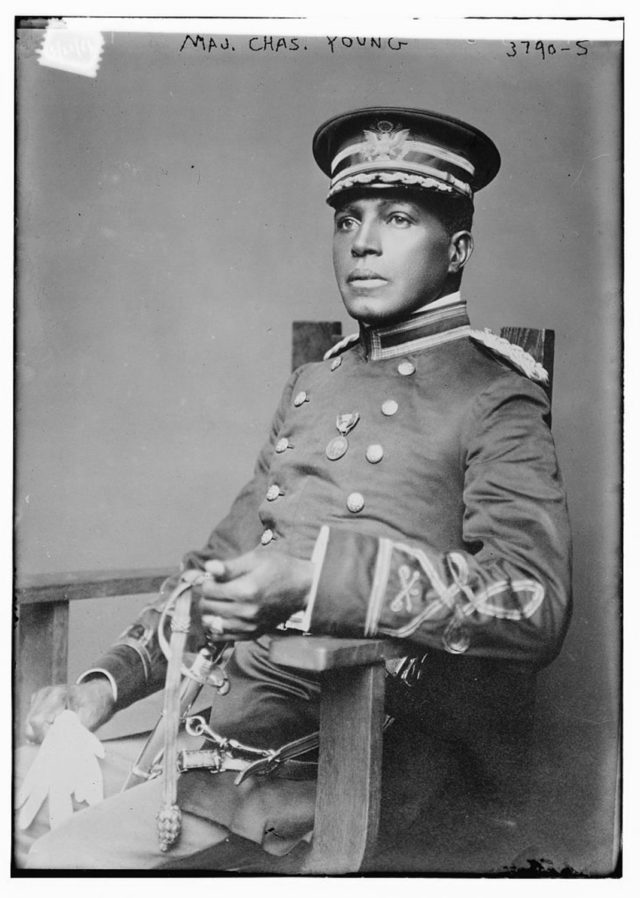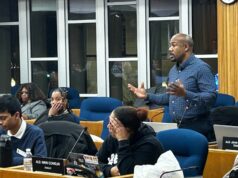
(CNN) — Charles Young, the first Black US Army colonel whose groundbreaking military career was hampered a century ago by the racism of the era, was posthumously promoted on Friday to brigadier general.
Young’s promotion retroactively makes him the first Black American recognized with that rank, the Army said.
The honorary designation, following years of efforts to posthumously promote him, was the focus of an official promotion ceremony at the United States Military Academy at West Point on Friday.
After Young was passed over for promotion before his death in 1922, a Black service member wouldn’t join the general officers rank in the Army until Benjamin Davis Sr. was promoted to brigadier general in 1940.
Young’s “promotion today to brigadier general has been a long time delayed, but fortunately for all of us no longer denied,” Under Secretary of the Army Gabe Camarillo said Friday in remarks during the ceremony. Camarillo also praised Young as a “model leader” and called his legacy “frankly inspiring.”
Members of Young’s family were in attendance at the ceremony, including his great niece Renotta Young, who was presented with Young’s posthumous honorary promotion order and certificate, a gold-plated leather belt that general officers wear, and a one-star general officer flag.
“Charles Young weathered social isolation not only at West Point but throughout his military and National Parks career,” Renotta Young recalled in a speech Friday, adding that despite the hardships Young faced, he “managed to love” the American experiment.
“While he felt the sharp sting of discriminatory treatment from his classmates here at West Point, at various points in his career from his superiors also, he did not consign all of White America to the racist side of the ledger,” she added.
Renotta Young told CNN it’s taken half a century to get her uncle promoted to brigadier general, an effort largely driven by her family and the Omega Psi Fraternity, Inc. in which Young is an honorary member.
“Even though it was long overdue, this was the time it happened, and I think this is the right time for folks to communicate the legacy of his life and what he has done for our country,” she told CNN.
Racism blocked Young’s career path
Born in 1864 in May’s Lick, Kentucky, to enslaved parents, Young graduated from high school with honors and became an elementary school teacher for two years. After encouragement from his father, Young took entrance exams for West Point but was not selected to attend despite having the second highest score. It wasn’t until a candidate dropped out the following year that Young received his acceptance letter and became the ninth Black attendee of the academy in 1884. During his time at the academy, he faced racism from instructors and fellow cadets but persevered. In 1889, he became the third Black graduate from the academy following Henry Ossian Flipper and John Hanks Alexander.
After graduating from the academy, it was three months before he received an assignment because at the time, Black officers were not allowed to command White troops, according to his National Park Service biography. He was commissioned as a second lieutenant and assigned to the Ninth Cavalry in Fort Robinson, Nebraska, and Fort Duchesne, Utah, a regiment of the “Buffalo Soldiers.” The Buffalo Soldiers were regiments of Black soldiers who played a key role in the US’ expansion of the West and were initially commanded by White officers. They also served as some of the first national park rangers and protected parks from poachers.
Young would break another barrier in 1903 when he became the first Black national park superintendent after he and his troops were assigned to manage Sequoia National Park in northern California. He was the first Black military attaché, became the first military attaché to Haiti and the Dominican Republic on the island of Hispaniola in 1904, and was appointed military attaché to Liberia in 1912. He also taught military sciences and tactics at Wilberforce University in Ohio in between his military duties.
Young received additional promotions during his military career, including major in 1912 and lieutenant colonel in 1916, according to NPS. He was medically retired in July 1917 and was promoted to colonel, the first Black man to reach that rank.
At the time, as he wrote to his longtime friend and civil rights activist W.E.B. DuBois, he was skeptical of the reasoning for the medical retirement, as he insisted he was in fine health and wanted to continue with his active service.
He was later recalled to helped train Black soldiers during World War I and in 1920, Young was sent back as military attaché in Liberia. While on a research expedition in Nigeria, Young became ill and died on January 8, 1922. After his death, his body was repatriated to the US and was buried in Arlington National Cemetery.
Young’s legacy grew in the century after his death. The Charles Young Buffalo Soldiers National Monument was established in 2013 in Wilberforce, Ohio, and in February 2020, Kentucky Gov. Andy Beshear, a Democrat, posthumously promoted Young to brigadier general in the Kentucky National Guard and sent a letter to President Joe Biden requesting he recognize Young with the promotion at the federal level. In November 2021, Under Secretary of Defense Gilbert Cisnero Jr. informed the House and Senate armed service committees that he had approved Young’s honorary promotion.
It was an attempt to address a long-running stain on the history of the US Army and to honor a man who, as memorialized by DuBois, was a “triumph of tragedy.”
“No one ever knew the truth about the Hell he went through at West Point,” DuBois wrote in an edition of the NAACP’s “The Crisis” publication a month after Young’s death.
“He was one of the few men I know who literally turned the other cheek with Jesus Christ,” DuBois wrote. “He was laughed at for it and his own people chided him bitterly, yet he persisted. When a white Southern pigmy at West Point protested at taking food from a dish passed first to Young, Young passed it to him first and afterward to himself. When officers of inferior rank refused to salute a ‘n***er,’ he saluted them. Seldom did he lose his temper, seldom complain.”
The-CNN-Wire
™ & © 2022 Cable News Network, Inc., a WarnerMedia Company. All rights reserved.

































